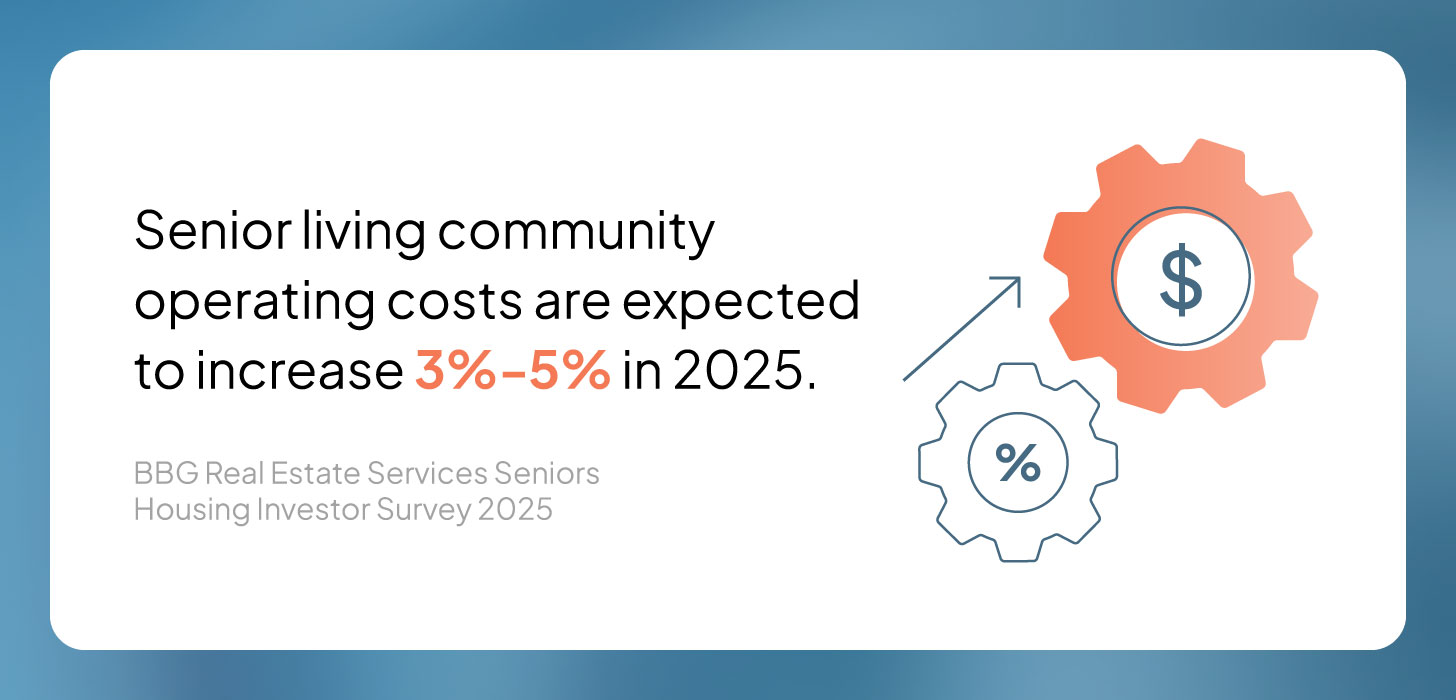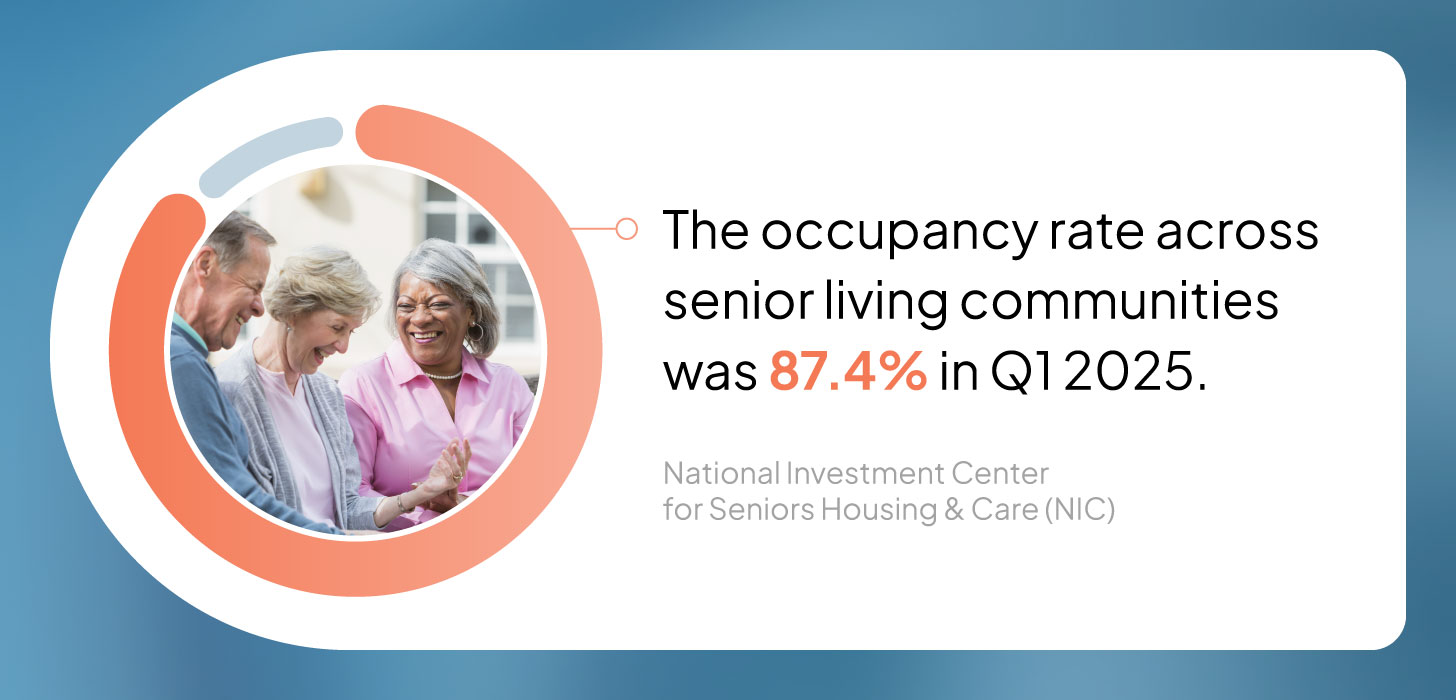6 Key Financial Challenges for Senior Living Communities and How to Solve Them
Overcome the biggest senior living financial challenges, including operational costs and occupancy rates, with interconnected software

Overcome the biggest senior living financial challenges, including operational costs and occupancy rates, with interconnected software
Published on: August 27, 2025
Last updated: September 11, 2025

Senior living operators are working to meet increasing demand from the aging population while also facing operational and economic hurdles. According to Haven Senior Living Partners, in the next five years, one out of every five Americans will be 65 or older, and the industry will need an additional 1.2 million workers.
Effectively managing the variety of financial challenges for senior living communities with the help of interconnected technology systems will support your community in achieving long-term sustainability while prioritizing high-quality resident care.
In fact, our State of the Senior Living Industry Report found that 86% of operators already use a financial platform, underscoring the essential role of technology like Aline Leasing & Billing in managing finances with accuracy and efficiency. By addressing today’s most pressing financial obstacles with the right tools and strategies, operators can strengthen their financial position, improve operational efficiency, and create an environment where residents thrive.
Revenue leakage often stems from operational inefficiencies, especially in billing and service tracking. By identifying common causes and addressing them with the right technology, communities can protect revenue and strengthen financial health.
Missed care updates are a frequent source of lost revenue, often caused by manual processes, disconnected systems, or miscommunication between clinical and administrative teams. When a resident’s care plan changes but the billing department isn’t notified, services may go under-billed or unbilled entirely.
For example, if a doctor updates a resident’s care plan to include additional daily assistance, but that information doesn’t reach the billing team, the resident may continue paying the old rate — leaving your community to provide more care without additional compensation.
An interconnected platform, like Aline Leasing & Billing, automatically syncs care updates with billing records in real time. This seamless data flow between care and billing eliminates manual entry, reduces the risk of missed charges, and ensures all services are billed accurately — protecting your revenue while maintaining transparency for residents and families.
Slow or inconsistent collections can quickly strain a community’s cash flow. Inefficient processes — such as relying on paper checks, manual invoicing, and limited communication with residents and families — often lead to payment delays. According to our State of Senior Living Industry Report, 16% of operators still manage finances entirely through Excel, leaving room for costly inefficiencies.
Financial software can automate and simplify collections, ensuring payments are received on time. Aline Payments streamlines the entire collection process. Residents and families can access a secure, easy-to-use payment portal to view statements, make one-time payments, or set up recurring payments via ACH, debit, or credit card.
Automation not only makes the payment experience more convenient for residents and families, but it also reduces the administrative load on staff, minimizes manual errors, and ensures more predictable cash flow. With built-in reminders and flexible payment options, Aline Payments helps improve collection rates and prevent revenue loss from late or missed payments.
Rising operational costs make it increasingly difficult for senior living operators to balance profitability with exceptional resident care. Every decision about care impacts the bottom line, and every budgetary choice influences the quality of care delivered. Protecting margins without compromising standards requires a strategic approach supported by the right tools.

Senior living is one of the most highly regulated industries with federal, state, and local requirements governing everything from staffing ratios and resident rights to medication management and infection control. The constantly evolving regulatory landscape forces communities to regularly update protocols, train staff, and document adherence — all while avoiding costly fines, legal exposure, and reputational risk.
Alines Quality simplifies and strengthens compliance efforts with configurable digital survey tools to perform regular audits and track adherence to internal policies, brand standards, and external regulations. Key features include:
This proactive, streamlined approach reduces the administrative burden while maintaining consistent compliance.
With the Consumer Price Index climbing across nearly every category, operators face mounting expenses for essentials, like food, supplies, and contracted services. Passing these costs to residents risks reducing affordability, making cost control and strategic purchasing essential.
Aline Accounting offers a centralized hub for financial data and robust reporting to manage spending effectively. Operators can:
A skilled, committed workforce is the backbone of every senior living community. Yet many operators are struggling to keep salaries competitive and retain talent in a tight labor market — a challenge intensified by the growing demand for caregivers, nurses, and support staff.
In today’s highly competitive labor market, attracting and retaining top talent often requires offering salaries above the average base pay. As the aging population grows, the demand for qualified staff rises, pushing wage expectations higher across every department.
Beyond competitive pay, communities also need to offer compelling benefits to build loyalty and reduce turnover risk. While health insurance, paid time off, and retirement savings remain standard, standout benefits may include tuition reimbursement, childcare assistance, and comprehensive wellness programs. These enhancements create a supportive work environment that fosters long-term employee commitment.
High turnover rates create a significant financial strain. Each departure brings expenses for recruitment, job postings, agency fees, screening, interviewing, onboarding, and training, not to mention productivity loss as new hires adapt to community processes.
Operators need a clear view of turnover’s true financial impact. For example, by tracking key retention metrics, identifying turnover patterns, and measuring associated costs.
With these insights, communities can make informed decisions on recruitment strategies, compensation structures, and engagement initiatives to reduce turnover, optimize staffing levels, and ensure resources are allocated where they have the greatest impact.
The senior living industry is enjoying positive occupancy momentum, a sign of strong demand and a key market trend. However, converting this demand into sustainable profitability remains a challenge. According to our 2025 State of the Senior Living Industry Report, managing profitable occupancy is the top concern for senior living operators.

The aging baby boomer generation is fueling unprecedented demand for senior living, but this opportunity comes with a challenge: price sensitivity. Prospective residents and their families closely weigh the value, amenities, and level of care against monthly costs. Significant rate increases can trigger hesitation or send them in search of more affordable options.
Raising rates to offset rising expenses without a clear pricing strategy risks deterring potential move-ins. To remain competitive, operators must evaluate pricing strategies that align with revenue goals, market demand, and resident expectations to ensure they capture high demand without pricing the community out of reach.
While demand is climbing, new community construction is lagging far behind industry needs. In the first quarter of 2025, only 1,076 new units were added nationwide, the lowest figure in more than 15 years, according to NIC.
If this trend continues, supply shortages will make it harder for older adults to access needed care. Forward-thinking operators should prepare now to meet the needs of a rapidly expanding population, whether through expansion of existing communities, creative use of available space, or partnerships that increase service capacity.
Navigating the complex web of reimbursements and diverse funding streams is essential to sustaining financial stability in senior living communities. Without the right systems in place, the risk of delayed payments, administrative bottlenecks, and missed revenue grows significantly.
Many senior living communities and their residents rely heavily on Medicare and Medicaid, but these health care payors often cover only a portion of care services, requiring operators to bill the remaining balance to other payors, whether commercial insurance, private pay, or a combination of sources.
This fragmented payment model puts ongoing pressure on financial teams to track, bill, and reconcile multiple payors accurately. Aline Leasing & Billing streamlines this process by centralizing billing data, automating charge updates, and ensuring accurate reimbursement from the right payors at the right time. As a result, you see improved billing accuracy, faster payment cycles, and maximized revenue capture.
Beyond government-funded payors, communities often manage a variety of additional funding sources, such as:
Each funding stream comes with its own eligibility rules, application steps, billing codes, and reporting requirements, creating a significant administrative burden. Missteps can lead to delayed payments or overlooked revenue.
With Aline Leasing & Billing, operators can track each funding stream and its specific requirements in one platform. This centralized approach reduces complexity, minimizes administrative delays, and ensures every eligible dollar is collected.
Securing and managing capital is a constant challenge for senior living communities, and the current economic climate has made it even more complex. Overcoming high-interest debt and finding viable funding sources is essential for sustaining operations, expanding services, and pursuing new development.
While interest rates have eased from recent peaks, they remain significantly higher than in previous decades with little expectation of returning to historic lows anytime soon. For senior living operators, this means financing expansions, renovations, or new developments comes with higher borrowing costs and thinner profit margins.
The situation is further complicated by what NIC calls a looming “wall of debt maturities” — nearly $10 billion in industry loans coming due in 2025. Refinancing this debt in today’s rate environment will be more expensive and potentially more restrictive, making it critical for operators to maintain a clear, real-time understanding of their financial position.
Economic volatility, persistent labor shortages, and shifting market conditions have made lenders more selective. Operators now face steeper equity requirements, tighter debt service coverage ratios, and less favorable loan terms — all of which can slow or stall growth plans.
To navigate these constraints, communities should explore alternative financing strategies, including private equity partnerships, joint ventures, and government-backed loan programs. Diversifying funding sources can provide the capital needed to move forward while reducing reliance on traditional lending.
Face financial challenges for senior communities head on with Aline Leasing and Billing software. Knowing you have the tools you need to track spend, manage payments, and make data-driven decisions will allow your team to operate confidently.
Learn how to maximize your revenue with smarter workflows using Aline’s Leasing & Billing and Accounting software to help your senior living community operate seamlessly and efficiently.


Amanda McGrory-Dixon
Amanda McGrory-Dixon is the content marketing manager at Aline, where she shares expert insights on how senior living communities can streamline operations, enhance resident satisfaction, and drive sustainable growth. With a deep understanding of industry trends and technology, she helps operators navigate challenges and implement data-driven strategies to improve efficiency, profitability, and care outcomes.
Blogs, stories and studies from the forefront of senior living operations

Lead generation surveys give senior living operators the data they need to understand their market, uncover new opportunities, and drive occupancy growth.

Prospect-centered selling helps senior living operators convert more leads and achieve occupancy goals through a more personalized, empathetic approach.

Gain insight into senior living pricing strategies for community success. Explore how Aline’s software optimizes revenue and operations

Take a look at how senior living software options, like Aline, can elevate operations, resident care, and ROI

Enhance efficiency, accuracy, and resident satisfaction by integrating a POS system into your senior living dining operations

See how emerging dining strategies help senior living communities streamline operations while fostering stronger connections with residents
We’re using cookies on this site to improve your experience. Cookies help us learn how you interact with our website, and remember you when you come back so we can tailor it to your interests.
You can find out more about cookies and usage on our cookie policy page.
Some of these cookies are essential, while others help us to improve your experience by providing insights into how the site is being used.
For more detailed information on the cookies we use, please check our privacy policy
Your experience is important to us. We’re redirecting you to our new Aline website, where you’ll discover how our complete suite of senior living solutions can help you grow occupancy and revenue, optimize operations, and enhance resident care.
For more information, you’re welcome to read our statement on our merger. To continue your web experience, simply close this notification.
Your experience is important to us. We’re redirecting you to our new Aline website, where you’ll discover how our complete suite of senior living solutions can help you grow occupancy and revenue, optimize operations, and enhance resident care.
For more information, you’re welcome to read our statement on our merger. To continue your web experience, simply close this notification.
Your experience is important to us. We’re redirecting you to our new Aline website, where you’ll discover how our complete suite of senior living solutions can help you grow occupancy and revenue, optimize operations, and enhance resident care.
For more information, you’re welcome to read our statement on our merger. To continue your web experience, simply close this notification.
Your experience is important to us. We’re redirecting you to our new Aline website, where you’ll discover how our complete suite of senior living solutions can help you grow occupancy and revenue, optimize operations, and enhance resident care.
For more information, you’re welcome to read our statement on our merger. To continue your web experience, simply close this notification.
Aline Innovation Summit 2026: Registration Now Open!
Connect with senior living leaders, innovators, and industry peers May 11-13, 2026, in Frisco, TX to explore the latest innovations, proven strategies, and best practices shaping the future of senior living. View details and register today.